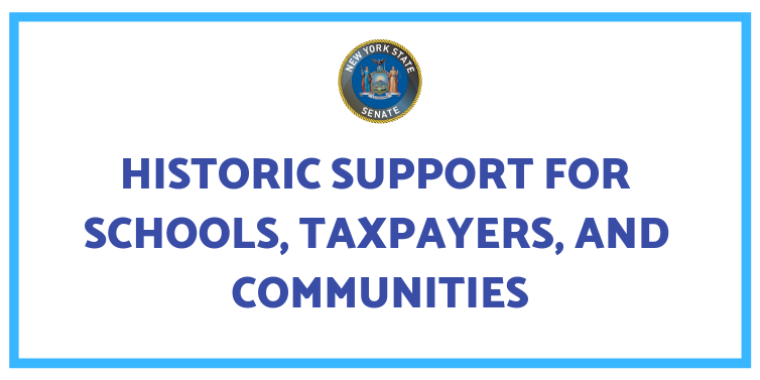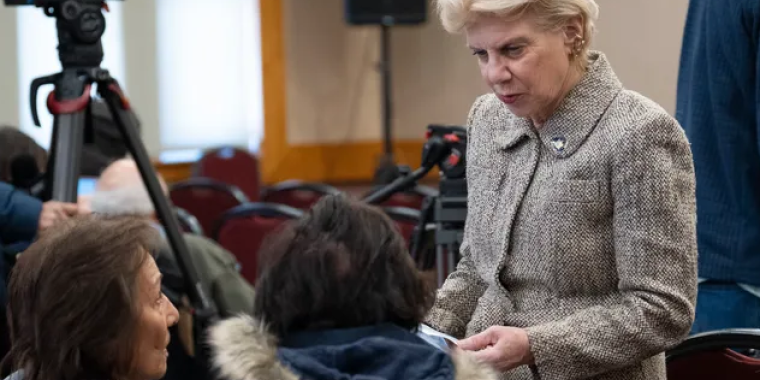
One-House Budget Provides Historic Support for Schools, Taxpayers, and Communities
March 14, 2019

Dear Friends:
It has only been two and a half months, but already the 2019 Legislative Session has shown what government can do. We have passed important legislation on voting reform, reproductive health, gun safety and protecting taxpayers. Now we are in the midst of the state budget negotiations, and this week, the Senate released its State Senate One-House Budget Resolution. I was proud to vote for this statement of our values in the context of a responsible and balanced budget which reflects significant commitment to our public schools, tax relief for middle class families, and restoration of AIM funding for our towns and villages. I know that we must make government work as an effective force mindful of the tax burdens faced by New Yorkers – and I believe our budget resolution reflects both of these values. While there are provisions in the Resolution that cause me concern, on balance, this is a terrific and forward-thinking resolution that I am proud to support.
Public Education is the Backbone of Democracy
I am proud to serve as the Chair of the State Senate Education Committee. The One-House Budget Resolution provides historic funding increases to advance educational opportunities across New York State, including:
- Increases School Aid by $1.62 billion or 6.0% over the 2018-2019 school year;
- Increases Foundation Aid by $1.2 billion or 6.8% over last year;
- Reforms the tuition assistance program (TAP) by increasing the minimum TAP award, the maximum TAP award, and increasing eligibility by raising the TAP income threshold so more New York families can benefit;
- And, for the first time, provides a new pool of $25 million in additional grants to school districts to support English Language Learning students;
- Provides $20 million for expanded pre-kindergarten grants, $5 million above the Executive;
- Increases funding for higher education, including an additional $5.8 million for community college base aid.
Providing Needed Tax Relief and Supporting Local Municipalities
The One-House Budget Resolution also:
- Restores $60 million in Aid and Incentives to Municipalities (AIM) funding for towns and villages;
- Rejects the proposal that would cap STAR benefits for taxpayers enrolled in the STAR Exemption Program as an attempt to incentivize enrollment into the STAR Credit Program;
- Rejects the proposal that lowers the income limit for the Basic STAR exemption to $250,000, while maintaining the existing $500,000 income limit for the STAR Credit Program;
- Provides $70 million for a new local government financial stability program for distressed local governments including, but not limited to, the City of Yonkers, school districts, jurisdictions impacted by tax certiorari related to electric generation and other jurisdictions facing significant fiscal distress.
Expanding Voter Access and Restoring Trust in State Government
At the beginning of the 2019 Legislative Session, the Senate Majority passed historic legislation to allow for early voting, same-day voter registration, closing the LLC Loophole. The One-House Budget Resolution builds on this progress by:
- Providing $10 million in funding for early voting and other voting reforms. These state funds will ensure that local governments are not required to spend additional money to implement the voting reforms enacted by state government;
- Supporting a publicly financed small donor matching system in order to curtail the corrosive influence of money in politics in addition to other necessary campaign finance reforms;
- Rejecting the Executive Budget proposal that would have resulted in grassroots and volunteer-run organizations being forced to register as lobbyists;
- Adding language to create a new Database of Deals to improve State economic development transparency and accountability.
Investing in Public Transit and Local Streets & Highways
One of the most frequent complaints that my District Office receives is about the state of local roads and highways. Historic underinvestment in our roads and infrastructure has led to numerous potholes and disrepair that has become burdensome and costly to residents. The One-House Budget Resolution approved by the new Senate Majority conference includes:
- An additional $150 million to be added to the base Consolidated Local Street and Highway Improvement Program (CHIPS) funding, for a total of $588 million in CHIPS funding;
- Reinstatement of funds for extreme weather infrastructure recovery.
These additional funds will ease the burden on local municipalities by providing state funding to repair and repave local streets and highways. In addition, the One-House Resolution includes:
- $350 million total for non-MTA Downstate transit systems, including Bee-Line, an additional $12.2 million over the Executive proposal, and $11 million for the Lower Hudson Transit Link bus service.
Quality Health Care Coverage that is Affordable
The One-House Budget Resolutions invests in health care needs and medical care providers by:
- Restoring millions in Medicaid cuts to our local hospitals;
- Providing $16 million for Title X Contingency funding and $2.75 million for public health programs including Sickle Cell, Alzheimer’s, Lupus and other community providers;
- Strongly opposing the Executive’s reprogramming of the Healthcare Facility Transformation money that was intended to provide much needed relief to hospitals and nursing homes;
- Restoring $3.8 million for School Based Health Clinics and $1 million for Lyme and Tick Borne Diseases.
Supporting Small Businesses
In addition to a package of bills that I was proud to vote in favor of this month to support small businesses throughout the 37th Senate District, the One-House Budget Resolution:
- Creates the Employer Recovery Hiring Tax Credit;
- Modifies the Executive proposal to update provisions of law relating to participation by minority and women-owned business enterprises (MWBE) in state contracts based upon the 2016 Disparity Study;
- Adds $365,000 in additional funding for the Minority and Women Owned Business Development and Lending Program;
- $300,000 in additional funding for the Federal Community Development Financial Institutions Program;
- Plans an evaluation of additional programs that would steer state and local dollars to community banks and credit unions, which would help provide additional lending access to underserved communities.
Protecting New York’s Natural Resources
I am committed to investing in proposals and supporting policies that address and mitigate the effects of climate change. The State Senate One-House Budget Resolution:
- Allocates an additional $2 billion, for a total of $2.5 billion, for clean water infrastructure projects such as improvements to solid waste management facilities, inter-municipal infrastructure projects, projects to address emerging contaminants, water quality improvement projects, concentrated animal feeding operations, and septic system replacement;
- Supports a proposed ban on plastic bags, as well as including a fee on paper carryout bags. The funds generated from the fees will be set aside to ensure that reusable bags are available to struggling New Yorkers and to ease the potential burden on disparately impacted communities;
- Amends the Environmental Protection Fund to provide additional funds for a number of Senate environmental priorities including $2 million for zoos, botanical gardens and aquaria, farmland protection, and greenhouse gas management.
In addition to school funding, CHIP funding, and supporting small businesses, the One-House Budget Resolution includes language which underscores the State Senate's commitment to tenant protection in Westchester County. I am also proud to vote in favor of a Resolution which protects taxpayers and workers by ensuring communities benefit when projects are supported by public dollars. When development projects receive tax incentives from the state or a local Economic or Industrial Development Agency, those projects should be required to pay prevailing wage, and every effort should be made to hire local workers.
For more details on the State Senate One-House Budget Resolution, click here.
Kind regards,
Shelley B. Mayer
Share this Article or Press Release
Newsroom
Go to NewsroomElectricity bills have many up in arms
March 14, 2025
